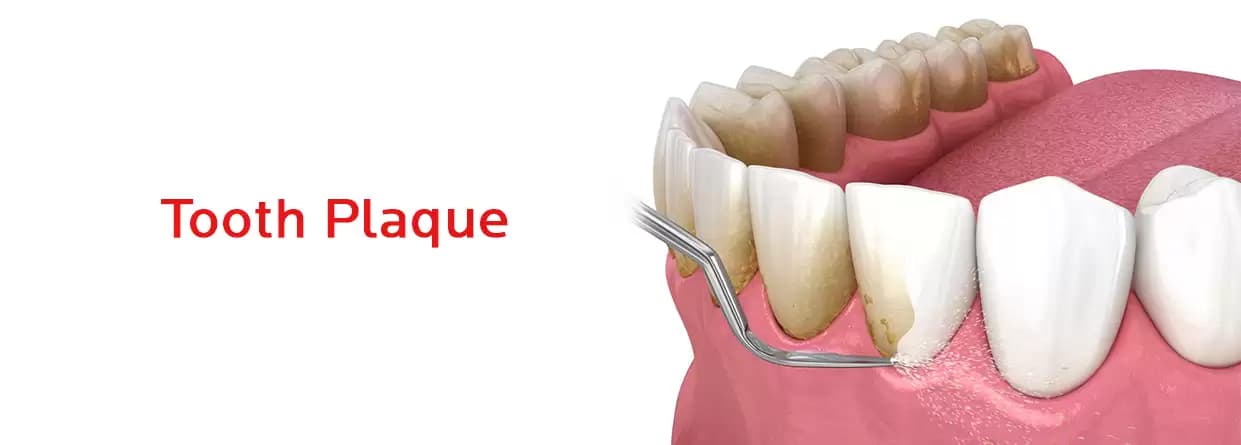
Tooth plaque also referred to as dental plaque is a bacterial sticky substance that continuously forms on the teeth. It is natural to form plaque, but if it is not removed from time to time with regular dental cleanings, regular brushing, and flossing, it causes gum illnesses, cavities, and other major health problems.
Tooth plaque is one of the health and dental concerns that are often ignored despite knowing the fact that it can be hazardous. It seems like a small and unnecessary concern, but it is important to know that it plays a vital role not only in our oral health but also in our overall well-being.
History is proof that humans have fought several dental problems and tooth plaque has been an unwavering rival, sneaking on our teeth without even a notice. This sticky film harbors an astonishing amount of bacterial activity despite its tiny size and harmless appearance causing a waterfall of dental troubles if left untreated.
In this blog, we are going to discuss the invisible intruder, tooth plaque, and involve its impact, prevention, and its role in maintaining our oral health and overall well-being. Please remember that this writing is only for knowledge purposes and the information given here is included after thorough research.
We don’t interfere with the consultation of a doctor in any way. Hence, if you have a problem with tooth decay, we highly recommend you book an appointment with a top dentist in Kolkata at the Calcutta Medical Research Institute. You will find the best and most highly-skilled dental experts with years of experience who will ensure the right diagnosis and treatment for you.
Tooth plaque also referred to as dental plaque is a bacterial sticky substance that continuously forms on the teeth. It is natural to form plaque, but if it is not removed from time to time with regular dental cleanings, regular brushing, and flossing, it causes gum illnesses, cavities, and other major health problems.
Plaque forms on the teeth as it contains bacteria, particles from leftover food, and saliva. When a person eats, the bacteria in the mouth stay on the food debris. It leads to breaking down the food into a film that is sticky and acidic.
There are common symptoms of dental plaque which are:
Tooth decay is caused by the formation of plaque or when bacteria in the mouth are mixed with foods that are starchy or sugary such as soft drinks, milk, pasta, juices, and fruits. The bacteria cause tooth plaque by releasing acids and destroying the enamel. Plaque can also grow on the roots of the tooth under the gum causing bone breakdown that supports the tooth.
If an individual is not into the habit of brushing and flossing daily, then it leads to hardening into tartar. Then, only a healthcare expert has the skills to remove tartar. If the situation is extreme, then dental plaque can cause various complications such as:
Tooth decay or plaque diagnosis is initiated by a dental professional or dentist during a frequent dental assessment. The doctor begins the diagnosis by using a dental mirror and probing to look for plaque formation on the teeth' surface. Plaque accumulated on the tooth causes decay and gum illnesses if not removed during daily oral hygiene. Doctors recommend dental check-ups for early diagnosis and to prevent oral health problems linked to plaque accumulation.
A dentist will involve using special tools for tooth plaque treatment. These tools are for tartar and plaque removal from the teeth. Other than this, the doctor might recommend:
If you want to reduce the risk of growing tooth plaque, then follow these tips:
Every human gets dental plaque once in their lifetime. There is nothing to worry about as long as it is not being overlooked. It is something that occurs because of consuming some food items and beverage choices. Tooth plaque doesn’t pose a serious problem if you don’t let it get accumulated on the teeth surface. Dentists recommend visiting them often to prevent serious oral health problems linked to dental plaque. There are certain practices you can include in oral hygiene such as flossing and brushing daily. If you are experiencing a serious tooth plaque issue, then book your appointment with The Calcutta Medical Research Institute today. You will find the best treatment options here that last for a longer term.
Tooth plaque can be removed naturally by practicing good oral hygiene such as flossing, daily brushing, visiting a dentist for regular check-ups, and regular cleaning.
Written and Verified by:
-Dr.-Sujoy-Mukherjee-(-Oral-%26-Maxillofacial-).webp&w=256&q=75)
Consultant - Oral & Maxillofacial Science Exp: 25 Yr
Oral & Maxillofacial Science
Dr. Sujoy Mukherjee is a Consultant in Oral & Maxillofacial Science at CMRI, Kolkata, with over 18 years of experience. He specializes in Maxillofacial Surgery Oral Surgery.
Similar Dental Sciences Blogs
Book Your Appointment TODAY
© 2024 CMRI Kolkata. All Rights Reserved.